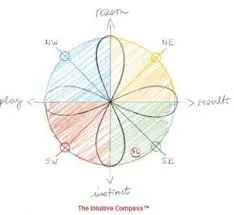Introduction: Ever Had a Gut Feeling That Turned Out Right?

Even if everything appears to be fine on the surface, you know that tiny voice in your head that murmurs when something feels strange? That’s your inner GPS, your intuition. It’s quiet, delicate, and frequently disregarded, but if you can develop your inner voice and pay attention to it, it can act as a reliable companion to help you navigate the turbulence of life.
In this article, we’re going to unpack the mystery of intuition. You’ll learn how to tell it apart from fear or overthinking, how to build a stronger connection with it, and how to start trusting your inner wisdom—even when it doesn’t make logical sense.
So, let’s dive into the world of intuitive guidance, shall we?
What Is Intuition, Really?

It’s More Than Just a Hunch
Intuition isn’t some woo-woo magic. It’s that “knowing without knowing why.” Psychologists call it subconscious pattern recognition, while spiritual folks call it divine inner guidance. In simple terms, intuition is your brain’s ability to make quick judgments based on past experiences, emotions, and subtle cues.
Why We Ignore Our Intuition
The Battle Between Head and Heart
Most of us have been taught to rely solely on logic. We’re told to analyze, plan, and calculate before making decisions. So when intuition pops up—quiet and subtle—we second-guess it. Our brain screams, “Give me evidence!” and intuition just calmly whispers, “I just know.”
Signs You’re Tuning Into Intuition
How to Tell It’s the Real Deal
Not sure if that inner nudge is intuition or anxiety? Here’s how intuition often shows up:
- A sudden clarity or insight
- Goosebumps or a physical “chill”
- A sense of peace when making the right decision
- Repeating signs or synchronicities
- A “pull” toward or away from something
It’s not always loud. Sometimes, it’s just a gentle feeling—but when it’s real, it resonates.
Intuition vs. Overthinking
The Key Differences
Let’s set the record straight. Intuition feels instant, calm, and neutral. It doesn’t come with a bunch of what-ifs or worst-case scenarios.
Overthinking, on the other hand, is noisy and chaotic. It floods your mind with doubt, fear, and mental chatter.
Here’s a quick comparison:
| Calm and clear | Anxious and noisy |
| No explanation needed | Needs justification |
| Immediate response | Looped thoughts |
How Intuition Communicates with You
It’s Not Always a Voice
Some people “hear” their inner voice, others “feel” it, and some “see” mental images. There’s no one-size-fits-all. Pay attention to how you experience intuitive nudges.
- Claircognizance – A sudden knowing
- Clairsentience – A gut feeling or emotional sense
- Clairaudience – Inner voice or auditory signals
- Clairvoyance – Mental images or visions
Practical Exercises to Strengthen Intuition
Flex Your Intuitive Muscle
Think of intuition like a muscle—the more you use it, the stronger it gets. Try these exercises:
1. Daily Quiet Time
Sit quietly for 5-10 minutes and just listen. Focus on your breath. Let thoughts pass, and tune into what’s underneath the noise.
2. Body Scan
Ask your body yes/no questions and notice where you feel tension or ease. Your body holds wisdom.
3. Intuition Journal
Write down your intuitive nudges and check back later. Were they accurate? You’ll start to notice patterns.
4. Follow Small Nudges
Practice following intuitive impulses in small ways—like taking a different route or texting someone out of the blue.
Real-Life Examples of Intuition at Work
Intuition Saves the Day
Ever heard someone say, “I just had a bad feeling about it”? That’s intuition talking.
- A woman avoids a car accident by changing her route at the last minute.
- An entrepreneur passes on a business deal that seemed perfect but later proves fraudulent.
- A teacher senses something is off with a student and ends up preventing a crisis.
These aren’t coincidences. They’re examples of people listening to their inner voice.
The Science Behind Intuition
It’s Backed by Research
Studies show that the brain can process data in milliseconds—way faster than we can consciously register. According to a 2008 study in Psychological Science, people made better choices when they relied on gut feelings rather than over-analysis.
Neuroscientists say intuition is the result of the brain accessing stored knowledge beneath our conscious awareness. It’s not magic—it’s mental efficiency.
Intuition and Emotional Intelligence
The Dynamic Duo
Strong intuition often pairs with high emotional intelligence. If you can read people, sense emotional shifts, or understand your own feelings deeply, chances are your intuition is already on point—and you’re well on your way to strengthening your inner voice.
The more in touch you are with your emotions, the clearer your intuitive messages become.
When Intuition Feels Wrong
False Alarms and Emotional Bias
Let’s keep it real: not every gut feeling is gold. Sometimes, fear or trauma can disguise itself as intuition.
If you’re reacting from past wounds or anxiety, your “intuition” might be misfiring. That’s why self-awareness and emotional healing are key.
Tools to Support Intuitive Growth
From Tarot to Meditation
Looking to deepen your intuition? Consider tools like:
- Meditation – Stillness strengthens your inner voice.
- Tarot or Oracle cards – Can spark intuitive insights.
- Dream journaling – Intuition often speaks through dreams.
- Mindfulness apps – Help quiet the mental chatter.
Trusting Your Intuition in Decision Making
Choosing With Confidence
Next time you’re stuck in analysis paralysis, ask yourself:
- What feels right in my body?
- What choice brings me peace—not fear?
- If I wasn’t afraid, what would I do?
Then trust that. Even if it defies logic.
Common Myths About Intuition
Busting the Myths
- Myth: Intuition is only for “spiritual” people.
- Truth: Everyone has it. It’s part of being human.
- Myth: It’s always right.
- Truth: It gets better with practice.
- Myth: You can’t explain it.
- Truth: You often can—you just have to dig deeper.
How to Know You’re Getting Better at It
Signs Your Intuition Is Growing
- You trust yourself more.
- You stop needing others’ validation.
- Decisions become easier.
- You feel more connected to your inner peace.
Conclusion: Listen to the Whisper Before It Shouts
Intuition isn’t a mystery—it’s a skill, a sense, a form of inner guidance that we all possess. The more you slow down, tune in, and trust yourself, the louder that inner voice becomes. Think of it as your soul’s compass, gently guiding you home.
The world may shout, but your intuition whispers. And that whisper? It always knows.
FAQs About Decoding Intuition
1. How do I know if it’s intuition or fear?
Intuition is calm and clear. Fear is anxious and loud. Intuition feels like “this is right,” while fear screams “what if?”
2. Can intuition be developed over time?
Yes! Like a muscle, the more you use and trust it, the stronger it gets. Journaling, meditation, and mindfulness help a lot.
3. Why do I ignore my intuition even when it feels right?
Conditioning. Society often teaches us to rely on logic. Strengthening your inner voice takes time and self-trust to override that habit.
4. Is intuition connected to spirituality?
It can be, but it doesn’t have to be. You don’t need to be religious to trust your gut strengthening your inner voice is a natural human trait.
5. Can trauma affect my intuition?
Absolutely. Unhealed trauma can create false signals. That’s why healing emotional wounds helps clarify your intuitive sense


